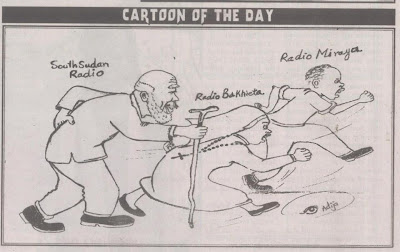Since I set foot
in South Sudan , a jingle has become part of my
daily soundtrack, the jingle of “Radio Miraya, the pulse of a new nation”.
Radio Miraya was launched on June 30 2006, in partnership with the United Nation
Mission in South Sudan (UNMISS) and the Fondation Hirondelle ,
a Swiss NGO constituted by journalists and humanitarian workers, whose aim is
to support independent information in war, crisis and post-conflict zones. With
the help of the Fondation HirondelleNepal , Sierra Leone , Liberia ,
DRC Congo and South Sudan , where Miraya (which
means Mirror in Arabic) is able to cover the whole country thanks to its 25
transmitters and its 140 national and international staff members. No wonder a
recent survey has ranked Radio Miraya the first radio of South
Sudan for credibility and quality of information provided.
I get up at 7:15
am every morning but I start to wake up only when I tune to Miraya Breakfast
Show, whose most popular feature is probably Miraya
Connect. According to the Fondation Hirondelle : “after a conflict, societies
do not only need to re-build their infrastructures, but they also need to
re-build their social network”. From 7:35 to 7:45 am, Miraya Connect receives calls of friends, relatives, classmates and colleagues
who have lost touch with their loved ones during the war and hope to re-connect
with them through the frequency of Miraya.
I
start to work at 8:30 am, so I cannot listen to the other programmes of Radio
Miraya, but when I happen to be home, I greedily listen to Tribes from 11:00 am
to 12:00 am, which broadcasts traditional music of South
Sudan ’s myriad of ethnic groups. If I want to be updated about
what’s happening at the moment, I do not
only listen to Miraya’s news but also to Inside South Sudan, that in the past
weeks has extensively reported on the border clashes between Sudan and South
Sudan, on the populations affected by the conflict and on the efforts by
communities, aid organizations, UN and governments to assist them. When I prepare
my dinner at 7 pm, my guests are those of the Round Table, a daily discussion
programme about the topical events effecting South Sudan .
I do enjoy very much their company, since they change every day, they let me
eat all my food without asking for sharing it and do not get offended when I
don’t listen to them anymore.
 Yei has also its own radio station, Spirit FM,
which has hosted Ibis few months ago for a talk show. It was difficult
to believe that through the red velvet walls of a tiny room, the voices of
Felix Amule, Central Equatoria State Coordinator for Budgeting and Planning, Daniel, the ALP project manager and those
of the County Education officials could be heard by thousands of
people listening on how important is the role of parents in the education of
their children. But the dozen of calls we got from the listeners, swept away my
doubts. In a country where almost nobody has power at home and where few can
read or buy a newspaper, a radio which run on batteries remains the only source
of information. Fortunately radio waves, as words, can float throughout
households and clans and villages spreading knowledge at no-cost as the South
Sudan’s Ministry of Education Science and Technology (MoEST) has noted. The MoEST has in fact implemented a Southern
Sudan Interactive Radio Instruction (SSIRI) project,
that provide learning opportunities for children, adults, and teachers with
activities like: the Learning Village, whose lessons are designed to complement
classroom instruction in local language literacy, English language,
mathematics, and Life Skills; RABEA (Radio Based
Education for All) that provides an opportunity for learning or strengthening
English language skills; Professional Studies for Teachers, a
distance learning course to improve the teaching practice.
Yei has also its own radio station, Spirit FM,
which has hosted Ibis few months ago for a talk show. It was difficult
to believe that through the red velvet walls of a tiny room, the voices of
Felix Amule, Central Equatoria State Coordinator for Budgeting and Planning, Daniel, the ALP project manager and those
of the County Education officials could be heard by thousands of
people listening on how important is the role of parents in the education of
their children. But the dozen of calls we got from the listeners, swept away my
doubts. In a country where almost nobody has power at home and where few can
read or buy a newspaper, a radio which run on batteries remains the only source
of information. Fortunately radio waves, as words, can float throughout
households and clans and villages spreading knowledge at no-cost as the South
Sudan’s Ministry of Education Science and Technology (MoEST) has noted. The MoEST has in fact implemented a Southern
Sudan Interactive Radio Instruction (SSIRI) project,
that provide learning opportunities for children, adults, and teachers with
activities like: the Learning Village, whose lessons are designed to complement
classroom instruction in local language literacy, English language,
mathematics, and Life Skills; RABEA (Radio Based
Education for All) that provides an opportunity for learning or strengthening
English language skills; Professional Studies for Teachers, a
distance learning course to improve the teaching practice.
Thanks to Radio
Miraya, I rarely walk without my portable radio, which has become a faithful
companion to my no more lonely meals.


A wonderful and enlightening post.
ReplyDelete